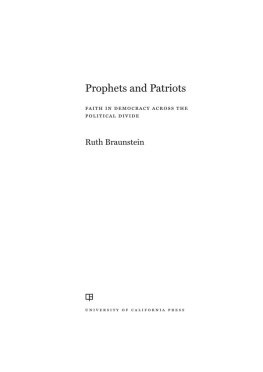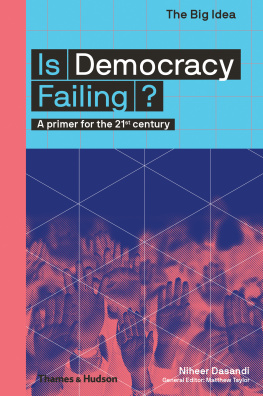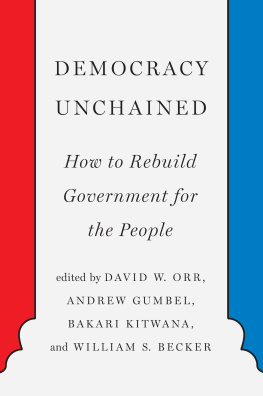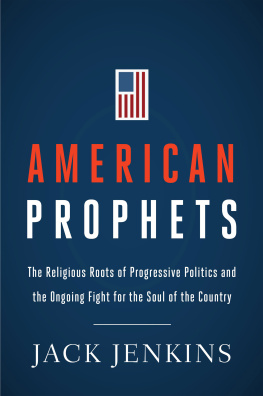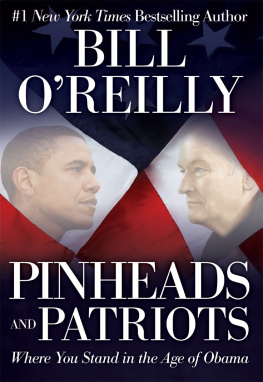Figure 1.
Figure 2.
Table 1.
Acknowledgments
Few pieces of writing are the product of a single mind, and this book is no exception. My largest debt of gratitude is owed to the men and women I met during the research for this project. Thank you for your patience, your candor, your humor, and most of all, your trust. Special thanks go to the women I call Linda and Nora, who opened the doors to the two groups in which I conducted fieldwork, answered countless questions, and remained supportive of this research even when they were uncomfortable with my observations and long after I surely wore out my welcome. While I was not able to include more than a fraction of the experiences I shared with these groups or of the stories that individuals shared with me, my wish is that they see in this book a sketch of their efforts that feels true.
While completing this project, I was privileged to receive mentorship, advice, and moral support from colleagues at New York Universitys Sociology Department and Institute for Public Knowledge and at the University of Connecticuts Sociology Department and Humanities Institute. At NYU, I received invaluable feedback and encouragement from Hillary Angelo, Melissa Aronczyk, Kathleen Gerson, Jeff Goodwin, Jennifer Heerwig, Colin Jerolmack, Jane Jones, Eric Klinenberg, Issa Kohler-Hausmann, Amy LeClair, Steven Lukes, Brian McCabe, Michael McQuarrie, Tey Meadow, Ashley Mears, Richard Sennett, Harel Shapira, Anna Skarpelis, Owen Whooley, and Grace Yukich. At UConn, I received generous feedback and support during the latter stages of writing this book from Claudio Benzecry, Mary Bernstein, Andrew Deener, Manisha Desai, Susan Herbst, Michael Lynch, Christin Munsch, Jeremy Pais, Bandana Purkayastha, Daisy Reyes, and Daniel Winchester.
Over the years, this book also benefited significantly because of feedback from and conversations with a wider community of scholars, including Jeffrey Alexander, Gianpaolo Baiocchi, Amy Binder, David Buckley, Hana Brown, Todd Nicholas Fuist, Brad Fulton, Philip Gorski, Neil Gross, Jeffrey Guhin, David Grazian, Drew Halfmann, Arlie Hochschild, Caroline Lee, Paul Lichterman, Myra Marx Ferree, Thomas Medvetz, Rory McVeigh, David Meyer, Ziad Munson, John OBrien, Andrew Perrin, Rebecca Sager, David Smilde, David Snow, Erika Summers-Effler, Nella Van Dyke, Jonathan VanAntwerpen, Rhys Williams, Nicholas Wilson, and Richard Wood.
Special thanks go to three mentors and conversation partners, who played an integral role in this project from its inception. From our first conversations about this project, Jeff Manza pushed me to consider both how the larger political context was shaping what I observed within these groups and why this research should matter to people beyond any single scholarly subfield. If this book provides satisfying answers to either of those questions, it is thanks to Jeffs honest critiques and to the stacks of books he lent me each time we met. Courtney Bender was an invaluable sounding board as I navigated the everyday complexities of ethnographic research; she also understood from the beginning that there was an interesting story to tell about the role religion played in these groups, even as I struggled to explain precisely what was religious about them. Our meetings over the years were like booster shots, invariably leaving me refocused and reenergized. Finally, I feel enormously privileged to have developed my ideas about this project, and about being a sociologist, through conversations with Craig Calhoun. His unique way of seeing the world, and his incisive comments on countless pieces of my writingoften sent from far-flung locales at all hours of the day and nighthave encouraged me to complicate and clarify the stories I am trying to tell. I can never thank him enough for his generosity, enthusiasm, and confidence.
Over the years, I was invited to present the developing arguments of this book in a number of venues, including Colby Colleges Sociology Department Colloquium; Columbia Universitys Religion and Politics in American Public Life Lecture Series; the Craft of Ethnography Workshop at NYU; Lehigh Universitys Humanities Center; the NYLON workshop in politics, culture, and social theory at NYU; the University of Pennsylvanias Urban Ethnography Workshop; Yale Universitys Center for Comparative Research; Yales Center for Cultural Sociology; Yales MacMillan Center Initiative on Religion, Politics and Society; and the Young Scholars in Social Movements Mini-Conference at the University of Notre Dames Center for the Study of Social Movements. I also presented aspects of this work at the annual meetings of the American Sociological Association, the Association for the Sociology of Religion, the Eastern Sociological Society, the Social Science History Association, and the Society for the Scientific Study of Religion. Overall, the generous feedback I received from these individuals and audiences significantly strengthened this research. To the extent that this book contains any remaining errors or weaknesses, the fault is entirely my own.
During the writing of this book, I benefited from the time and support afforded to me as an American Fellow of AAUW and a Public Discourse Project Faculty Fellow at the UConn Humanities Institute. I also gratefully acknowledge the generous support for this research from the NYU Sociology Department and the UConn College of Liberal Arts and Sciences (CLAS) and CLAS Book Support Committee. Additional thanks go to Debbie Ivens Lewites for her transcription services. I am also deeply indebted to Naomi Schneider at the University of California Press for her support for this project. Thanks, too, to the outside reviewers whose detailed feedback pushed me to sharpen the arguments in the book, as well as to the entire UC Press team who guided me through the production process.
I wish to acknowledge that portions of this book were adapted from the following previously published works: Who Are We the People? in Contexts (2011); Who Are We the People? Multidimensional Identity Work in the Tea Party, in Understanding the Tea Party Movement, edited by Nella Van Dyke and David S. Meyer (Ashgate, 2014); and The Role of Bridging Cultural Practices in Racially and Socioeconomically Diverse Civic Organizations (with Brad R. Fulton and Richard L. Wood), in American Sociological Review (2014).

